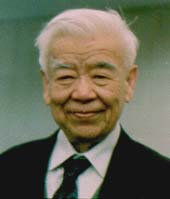Ta-You Wu
| Wu Ta-You | |
|---|---|
 |
|
| Native name | 吴大猷 |
| Born | 27 September 1907 Panyu, Guangzhou, Qing Dynasty |
| Died | March 4, 2000 (aged 92) Taiwan, Republic of China |
| Nationality | Republic of China |
| Fields | nuclear theoretical physicist |
| Alma mater | University of Michigan |
| Notable students |
Chen Ning Yang Tsung-Dao Lee |
| Signature | |
Wu Ta-You (simplified Chinese: 吴大猷; traditional Chinese: 吳大猷; pinyin: Wú Dàyóu) (27 September 1907 - 4 March 2000) was a Chinese atomic and nuclear theoretical physicist (1907–2000) who worked in the United States, Canada, mainland China, and Taiwan. He has been called the "Father of Chinese Physics."
Wu was born in Panyu, Guangzhou (Canton) in the last years of the Qing dynasty. In 1929 he took his undergraduate degree at Nankai University in Tianjin (Tientsin). He moved to the United States for graduate schooling and took a Doctor of Philosophy Degree from the University of Michigan in 1933. Dr. Wu returned to China (then Republic of China, and between 1934 and 1949 he taught at various institutions there, including Peking University in Beijing, and National Southwestern Associated University in Kunming. In 1949, the year of the defeat of the Nationalists by the Communists in the Chinese Civil War, Wu moved to Canada. There he headed the Theoretical Physics Division of the National Research Council until 1963. In the late 1960s, he was Chair of the Department of Physics and Astronomy at the University at Buffalo. After 1962, he held various positions in Taiwan (Republic of China), including the President of the Academia Sinica (1983–1994). He continued lecturing into his 90s and died on March 4, 2000.
...
Wikipedia

